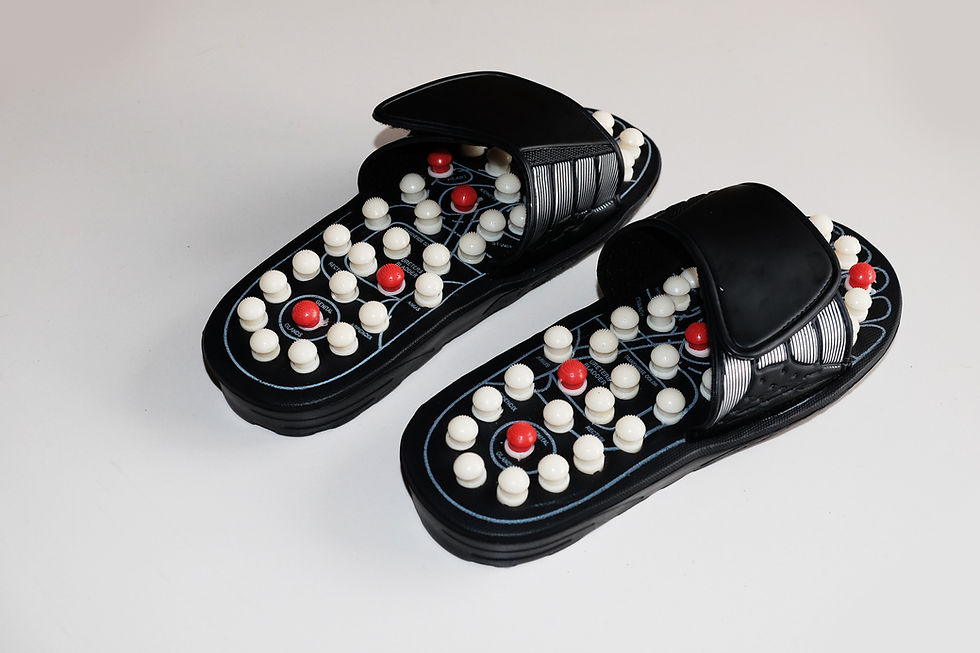“Living with CCCA: My Diagnosis Journey and What You Should Know”
- Ericka Davis

- May 4, 2025
- 4 min read
By Emarii Davis

For years, I noticed subtle but persistent changes in my hair—thinning at the crown, and the edges, scalp tenderness, and eventually visible patches that wouldn’t grow back. Like many women of African descent, I thought it was stress, styling, or age. But in February 2025, I received a diagnosis that gave a name to what I was experiencing: Central Centrifugal Cicatricial Alopecia (CCCA).
What Is CCCA?
CCCA is a form of scarring hair loss that begins at the crown of the scalp and spreads outward. It’s most common in Black women and often goes undiagnosed until significant damage has occurred. The condition involves inflammation that destroys hair follicles and replaces them with scar tissue, which often makes regrowth difficult or even impossible.
My Path to Diagnosis
My journey led me to Dr. Hope Mitchell, a dermatologist who truly listened and understood both the science and the cultural nuances behind my symptoms. She performed two punch biopsies—one from my frontal left scalp and one from my medial parietal scalp—and sent them to Inform Diagnostics for evaluation.
The results came back with clarity and confirmation:
Scarring alopecia, consistent with Central Centrifugal Cicatricial Alopecia (CCCA).
The pathology report noted:
Perifollicular fibrosis (scarring around the follicles)
Patchy lymphocytic infiltrates (inflammation from immune cells)
Asymmetric thinning of the follicular epithelium (structural damage to follicles)
These microscopic findings confirmed what I had long suspected: this wasn’t regular hair loss—it was a medical condition requiring a holistic approach.
Breaking Myths: It Wasn’t My Hair Practices
In my search for answers, I’ve watched videos and read articles blaming CCCA on the traditional hair care practices of African American women—tight braids, weaves, chemical relaxers. While those practices can contribute to scalp stress in some cases, this was not my story.
I’ve always been gentle and intentional with my hair. For me, this wasn’t about products or styling. It was about a gene I unknowingly carried, which chose to activate at this point in my life.
The Science: CCCA and the PADI3 Gene
Research, including a 2019 study published in the New England Journal of Medicine, links CCCA to a mutation in the PADI3 gene (peptidyl arginine deiminase type III). This gene is essential for proper hair shaft formation. When its function is impaired, the hair becomes structurally weak, and the scalp becomes more vulnerable to inflammation and scarring.
This scientific connection provides affirmation: CCCA isn’t just about external practices. For many of us, it starts within—at the genetic level.
Understanding this helps shift the narrative from blame to healing, from stigma to empowerment.
A Holistic Journey Confirmed
This diagnosis didn’t just give me clarity—it confirmed that the holistic lifestyle choices I had already been making were working.
What I was already doing:
Eating a nutrient-dense diet to reduce inflammation and support overall wellness.
Staying physically active to stimulate blood circulation.
Using herbal remedies and creating my own natural hair soap—free of harsh chemicals and full of healing ingredients.
Now I had clinical confirmation that these practices were aligned with what my body needed.
My Treatment Plan: Science Meets Nature
In addition to my holistic routines, Dr. Hope Mitchell prescribed a medical treatment plan to help reduce inflammation, preserve healthy follicles, and slow the progression of scarring.
🧴 Prescribed Medications
1. Clobetasol Propionate (Topical Corticosteroid)
This is a potent anti-inflammatory applied directly to the scalp. It helps calm the body’s immune response and reduce the chronic inflammation that causes scarring in CCCA.📚 Source: National Institutes of Health – Topical Corticosteroids in Alopecia
2. Minoxidil (Topical Solution)
Commonly known as the active ingredient in Rogaine, Minoxidil increases blood flow to hair follicles and may help stimulate regrowth in areas not yet fully scarred.📚 Source: American Academy of Dermatology – Minoxidil for Hair Regrowth
3. Doxycycline (Oral Antibiotic)
Though traditionally used for bacterial infections, doxycycline also has anti-inflammatory properties. It's prescribed in CCCA to help control inflammation and prevent further damage.📚 Source: Journal of the American Academy of Dermatology – Anti-inflammatory use of Doxycycline
These medications work in partnership with my natural practices, not in opposition. I believe in blending the best of modern medicine and natural healing, and this integrated approach is helping me reclaim not only my scalp health—but also my confidence.
New Additions to My Self-Care Regimen
Since receiving the diagnosis, I’ve added new tools to my wellness toolkit:
Consistent meditation to reduce stress and quiet the mind.
Weekly yoga to support flexibility, blood flow, and emotional balance.
Prayer and spiritual reflection, which ground me in peace and help me stay centered.
With the hustle and bustle of life, these practices have become sacred spaces. They remind me that healing is not just physical—it’s mental, emotional, and spiritual.
What I’ve Learned
1. Early diagnosis is critical.The sooner you seek help from a trusted dermatologist, the better your chances of managing the condition effectively.
2. Scarring doesn’t mean hopeless.With treatment, lifestyle changes, and support, you can calm the inflammation, preserve remaining hair, and find confidence again.
3. You are not alone.So many women are silently struggling. Talking about CCCA is an act of courage and community healing.
Moving Forward
With the guidance of Dr. Hope Mitchell and the strength of my own intuition, I am facing CCCA with grace, resilience, and clarity. I’ve chosen to trust my body, honor my roots, and walk a path of wholeness—rooted in nature, guided by faith, and supported by science.
If you’re noticing hair changes, don’t ignore them. Listen to your body. Advocate for yourself. Get the biopsy. Ask the questions. You deserve answers.
And remember: you are not alone.



Comments